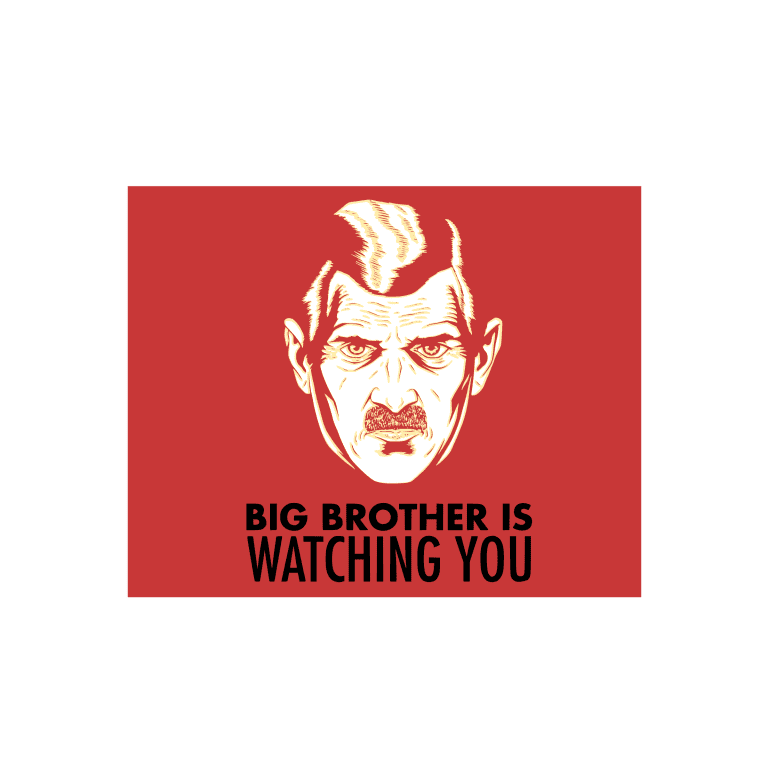
In George Orwell’s novel 1984, also adapted to film, the government keeps all of its citizens under constant surveillance, using two-way screens installed in every home, watching your every move under the slogan “Big Brother Is Watching You.”
Orwell was projecting a terrifying dystopia. But some people today–especially those born after 1984–actually think this would be a good idea.
J. D. Tuccille has written a rather disturbing article for Reason Magazine entitled Why Are So Many Younger Americans OK With Big Brother Monitoring Their Homes?, partially answering the question with the deck “Children raised in an atmosphere of fear become adults who prioritize security over liberty.”
He cites research from the Cato Institute, the libertarian think tank, that asked 2000 Americans whether they “favor or oppose the government installing surveillance cameras in every household to reduce domestic violence, abuse, and other illegal activity.” (Go here for the report.)
Overall, 75% said “no.” It’s still rather surprising that 14% of Americans favor the idea and that 10% “don’t know.”
But the age breakdown is more concerning. Among “generation Z,” Americans aged 18-19, nearly one out of three (29%) are in favor of government surveillance cameras in our homes. Among those aged 30-44, one out of five (20%) like the idea of Big Brother watching.
Then the numbers go down precipitously, with only 6% of both the 45-54 and the 55-64 aged cohorts. Us elderlies over 65 are the most zealous guardians of personal liberty and privacy, with only 5% being open to Big Brother.
To be sure, most Americans of all demographics oppose the idea. We can wonder, though, why some of them do not. Specifically, why are so many young adults OK with government surveillance?
Tuccile asked some experts and offers some ideas:
“I think there are two ways to think about this new finding from Cato and both can be true at the same time, and may even be connected,” psychologist Clay Routledge, Vice President of Research and Director of the Human Flourishing Lab at the Archbridge Institute, told me by email. “The first is a story of technology driving changing attitudes. Younger generations have grown up with less privacy than older generations because of technological trends related to smartphones and social media so this finding may represent a greater comfort with more surveillance as a result of how they grew up. The second is a story of mental health driving changing attitudes. Younger generations are more anxious and when people are anxious they become more likely to privilege security over freedom so this finding may represent a greater comfort with less freedom as a result of greater mental distress. And these explanations might be connected because the growing surveillance culture and social media more broadly may be contributing to higher rates of anxiety which ironically may lead to greater support for more surveillance, leading to more anxiety.”. . .
Other experts connect the sentiment to the “snowflake” aversion of many young adults to being “triggered” by ideas they disagree with:
Routledge’s concerns echoed those of Greg Lukianoff, president of The Foundation for Individual Rights and Expression, and social psychologist Jonathan Haidt in “The Coddling of the American Mind,” an article published by The Atlantic in 2015 and later expanded into a book. They delved into the then relatively new phenomenon of intolerance on college campuses for the free exchange of ideas. The roots, they suggested, lay in overprotective childrearing that encouraged anxiety and warped culture.
“Stories of abducted children appeared more frequently in the news, and in 1984, images of them began showing up on milk cartons. In response, many parents pulled in the reins and worked harder to keep their children safe,” they wrote. “The flight to safety also happened at school.”
The result was a “vindictive protectiveness” that smothered dissent and prioritized safety over liberty.
I think it has something to do with the percentage of people who have not read 1984.
As concerns are being raised about the threat to privacy posed by today’s information technology and the potential of the government to use that technology to monitor its citizen’s behavior, as is already happening in Communist China, some Americans just don’t care about any of that. And that indifference looks to increase with the rising generations.
The trade off between security and freedom is a perpetual issue. Tuccile quotes Rutledge again: “I do think this new finding from Cato is just one indicator of a very real trend of Americans, and especially younger generations of Americans, prioritizing security over freedom.”
Illustration from Free SVG, Public Domain














